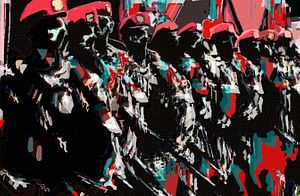U.S. Defense Secretary Jim Mattis was seen laughing and smiling this week as he watched a military exercise in Jakarta in which Indonesian troops drank snake blood, rolled in glass, broke bricks with their heads, and walked on fire. The spectacle would hardly be amusing, however, to anyone familiar with the Indonesian military’s human rights violations, especially the record of its special forces unit, Kopassus.
Mattis’s visit was part of U.S. efforts to improve military cooperation with Indonesia. During his staym he discussed with Indonesian Defense Minister Ryamizard Ryacudu plans to resume U.S. assistance to Kopassus. Assistance to the unit had been halted in large part because of the U.S. “Leahy Law,” which bars US assistance and training to foreign military units known to have committed gross human rights abuses, unless the government has taken steps to remediate, address the abuses, and hold those responsible to account.
The U.S. military first announced plans to re-engage with Kopassus in 2010, hoping to train newer “untarnished” soldiers, but in subsequent years remained reluctant to proceed, in part because Indonesia had largely failed to address past abuses.
There are a whole series of abuses to address. The U.S. government first imposed restrictions on military assistance to the Indonesian military and Kopassus in 1999, after the military committed massive rights abuses during its scorched earth campaign in East Timor. Kopassus members were also implicated in abductions and enforced disappearances of student activists in 1997-98, and the murder of the Papuan activist and leader Theys Eluay in 2001.
But other incidents have also occurred since then as well. In 2003, Human Rights Watch documented how Kopassus soldiers used torture during military operations in Aceh. In a 2009 report, Human Rights Watch documented Kopassus soldiers engaging in arbitrary detention and mistreatment of civilians in Merauke, Papua, suspected of involvement in Papua’s independence movement. More recently, Kopassus has been involved in unlawful spying activities against Papuan civilians.
In an interview with journalists in Jakarta, Mattis suggested that Kopassus had reformed and removed abusive personnel from its ranks. But that is not the appropriate legal test for whether U.S. assistance can be resumed. As Senator Patrick Leahy said on January 23, “The question Secretary Mattis needs to answer is whether the Indonesian government has punished the Kopassus officers who ordered and covered up those horrific crimes, and whether members of Kopassus today are accountable to the rule of law.”
The answer to both those questions is no.
To be sure, there have been some prosecutions that the government has trumpeted. A military court found 11 Kopassus soldiers guilty in the case of the kidnapping of student activists in 1998. The men were never jailed, however, and after an appeal almost all of them were allowed to remain in the military. Their commanding officers were never even tried.
Likewise, in 2003, a military court in Surabaya found seven Kopassus soldiers guilty in the death of Theys Eluay. But the men were sentenced to only two to three-and-a-half years in prison, and human rights groups can’t even confirm that the men served their time. (At the time of their trial, Ryacudu, then the army chief, hailed the convicted soldiers as “Indonesian heroes” for killing a “rebel.”) Notably, the troops’ commanding officer, Lt. Colonel Tri Hartomo, was later promoted, now to lieutenant general, and heads Indonesia’s military intelligence agency.
Many other Kopassus officers involved in abuses in East Timor, Aceh, and Papua, have never faced trial. One commanding officer, Prabowo Subianto, alleged to have led the 1983 Kraras massacre in East Timor where more than 300 people were killed, ran for president in Indonesia’s last election and is now the leader of main political opposition party. Another officer, Muchdi Purwopranjono, was tried on charges relating to the 2004 poisoning and murder of Munir bin Thalib, a prominent human rights lawyer, but was acquitted.
To be sure, there have been overall improvements in the unit’s record, with few current allegations of abuse today—although that is primarily because there are no significant counterinsurgency operations underway in Indonesia as in past years. And in 2013, the military prosecuted 11 Kopassus soldiers for breaking into a prison and killing four detained civilians allegedly involved in a lethal bar fight with another Kopassus member.
But impunity for past abuses remains, and there has been little remediation of the unit’s record. The fact that abusive personnel have retired or transferred out of Kopassus cannot be seen as progress, and it certainly should not be mistaken for justice.
Only when the Indonesian government shows that it is serious about punishing past abuses and creating a culture of accountability should the U.S. government consider allowing U.S. military assistance to resume. For now, to restore assistance to Kopassus is to reward Indonesia for doing nothing.
Andreas Harsono is an Indonesia researcher at Human Rights Watch.

































